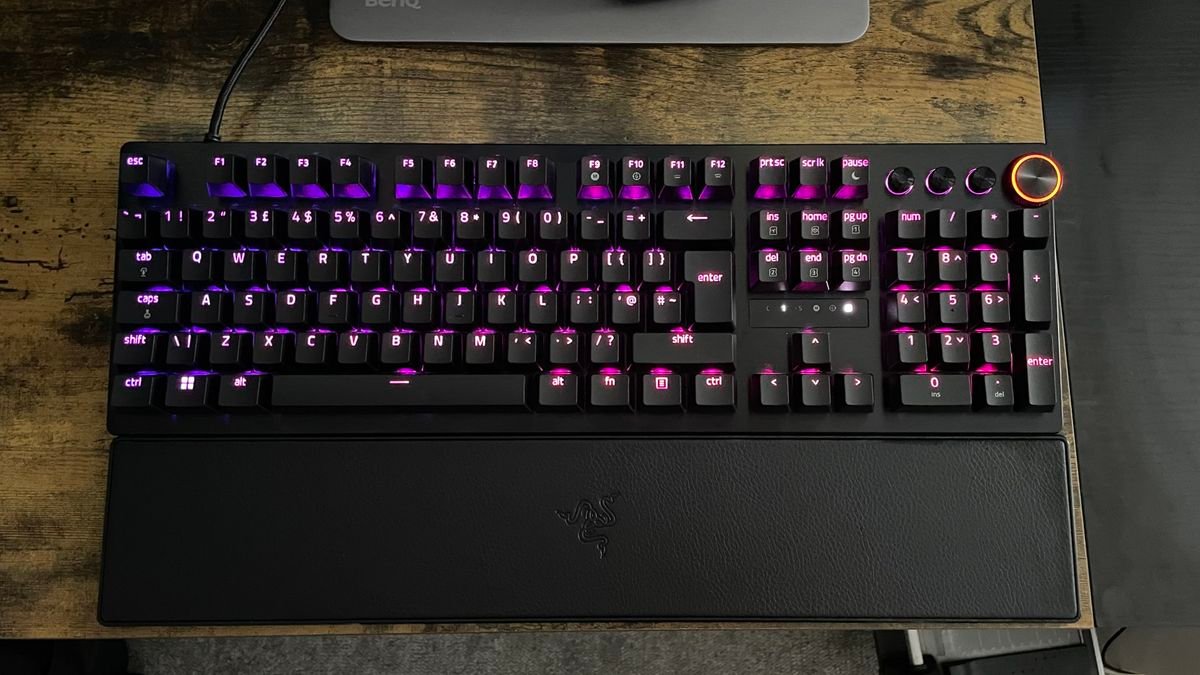Razer Huntsman V3 Pro: Two-minute review
The Razer Huntsman V3 Pro is a high-end gaming keyboard that offers a variety of useful features, including the ability to adjust key sensitivity, swap profiles quickly, perform two functions using a single key, and much more.
It follows on from the impressive Razer Huntsman V2 Analog, which at the time of writing occupies the top spot in our best gaming keyboard guide – and at first glance, the Huntsman V3 Pro’s capabilities appear largely the same, although there are some key differences that set them apart.
Firstly, the Huntsman V3 Pro features the second generation of the Razer Analog Optical Switch, which offers the option to alter the actuation within a range of 0.1-4.0mm, allowing for a much broader range of sensitivity customization compared to the V2’s 1.5-3.6mm. This means that you have even more control over how responsive the keys are, ensuring they’re fully optimized for whatever you’re playing. Optical (or opto-mechanical) switches are also more durable and offer faster input times than conventional mechanical or membrane keys.
This upgraded level of sensitivity is pretty incredible to experience – when set at 0.1mm it takes only the slightest touch to trigger a key. While this is useful for some games, however, unless you’re a world-class touch typer you may want to keep an eye on your settings if you plan to use this keyboard for both work and play, as in my experience, trying to type with a shallow actuation point leads to typos galore.
These switches also facilitate the Rapid Trigger Mode function, which makes it possible to repeatedly press and release the keys at a fast pace, far surpassing the capabilities of a standard keyboard, and possibly giving you an advantage over other players. In practice, this function does indeed make a difference in games – it’s noticeable that the key doesn’t have to travel past a fixed reset point, meaning that it’s possible to repeat inputs with minimal movement.
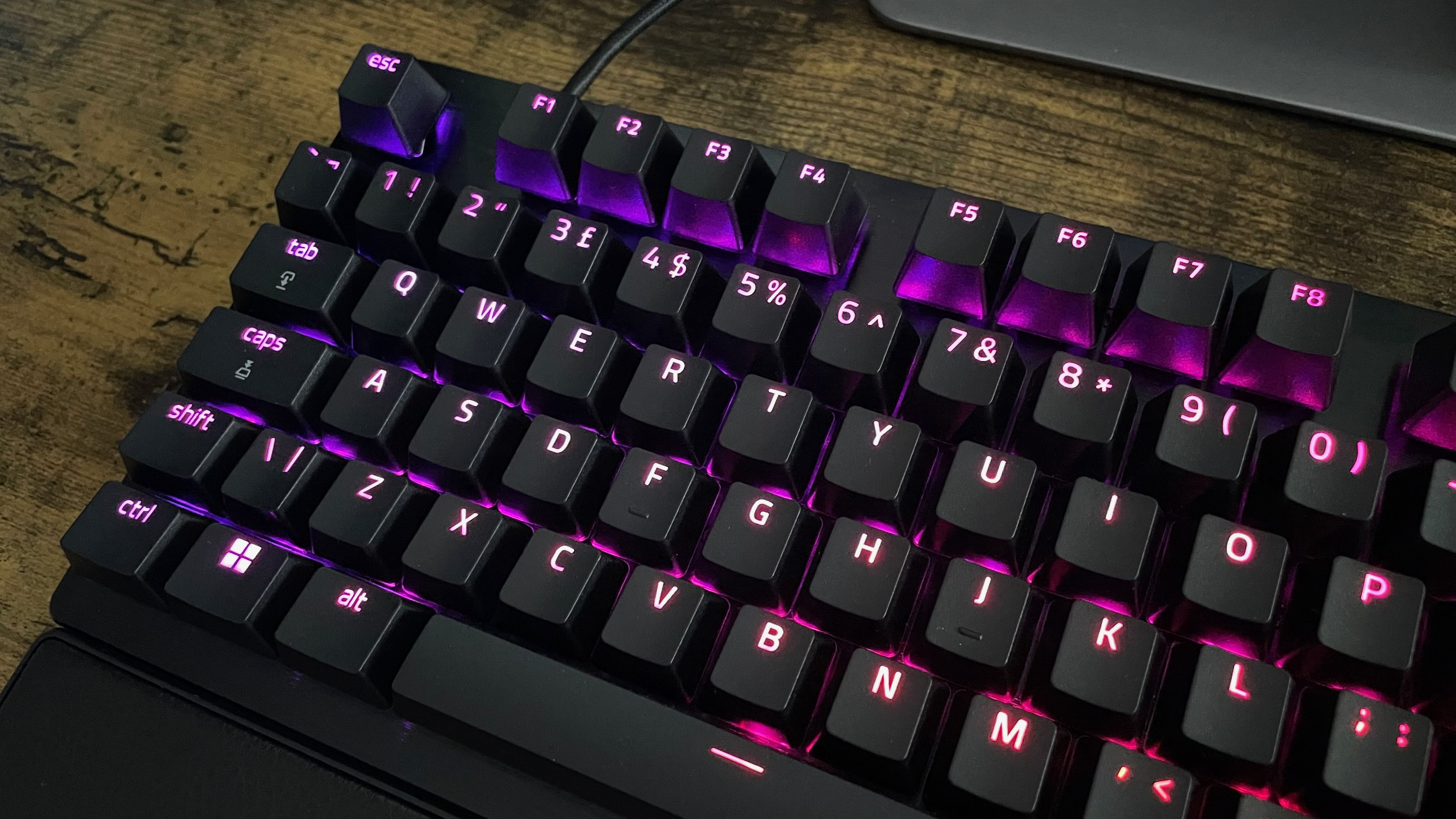
Another standout feature is the intuitive on-board adjustments. Easily triggered by pressing two keys and twisting the dial, you’re able to increase or decrease the actuation point or rapid trigger sensitivity, with a super-helpful LED indicator located above the directional keys so that you can quickly adjust your levels and carry on playing.
The Huntsman V3 Pro is available in matte black with a brushed aluminum alloy faceplate and shiny media controls, and it looks pretty satisfying even without its RGB lights pulsing. The base of the keyboard is made of plastic and has two-stage adjustable feet, so you can alter the angle to suit. This full-size keyboard measures 5.5 x 1.5 x 17.5 inches / 139 x 39 x 445 mm, and is pretty weighty at just over 2.7lb / 1.2kg. The opto-mechanical keys have a long travel and sound quite clacky, so if you’re not a fan of shallow laptop-style keys then you’ll probably be happy.
The keyboard is powered by a removable USB-C cable on the left-hand side. I had no issues with this, although this might be something to note if your gaming machine is to the right of your setup. You get all of the keys you’d expect from a standard full-size keyboard, with the addition of some multi-function media buttons at the top-right. These include two macro buttons that load up the Xbox Game Bar and Task View on Windows by default. These keys can be easily remapped in the Razer Synapse app to perform a wide range of functions – you can set them to launch a program, trigger a Windows shortcut, perform a keyboard or mouse operation, and so on.
An additional button gives you easy access to multiple audio controls – you can play and pause with one press, skip tracks with two presses, and return to the previous track with three presses. The multi-function digital dial is a quick and tactile way to control volume levels, and makes it easy to mute your audio by pressing the center.
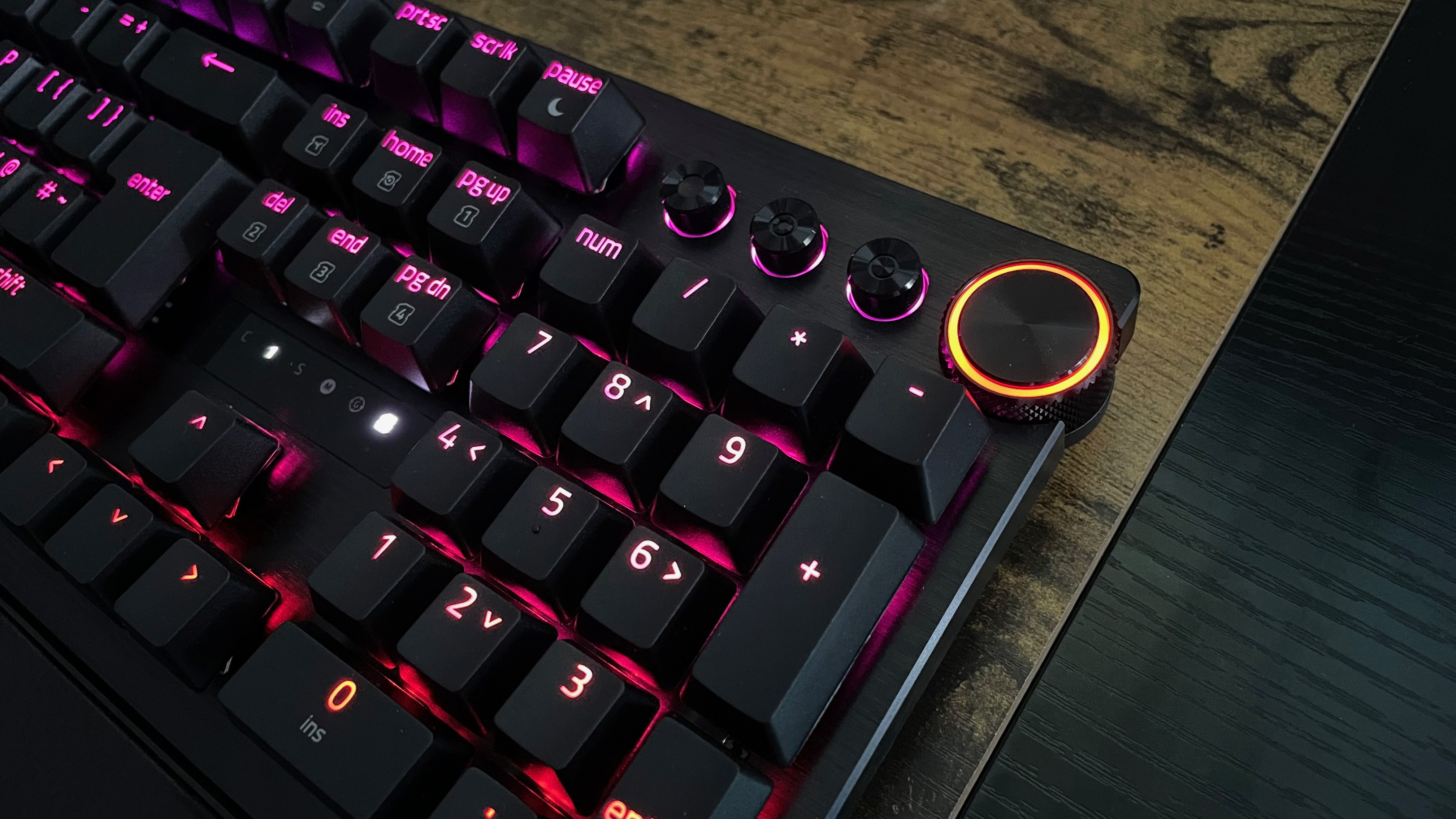
The keyboard comes with a removable wrist rest; however the magnet attachment that’s supposed to keep it on the front of the keyboard is not very strong, so it can be easily knocked or moved. The rubber feet do an okay job of keeping it in place if it’s flat on your desk, but if it’s a little over the edge and not in full contact with the desktop it does like to wander off with the slightest nudge. The flatter design is a considerable downgrade from the Huntsman V2 wrist rest, which was much more comfortable.
While I understand that the leatherette material used on the V2 didn‘t fare too well over time, this new wrist rest is so flat that it verges on obsolete. In addition – although this doesn’t affect the operation of the keyboard in any way – I’m very disappointed that Razer has chosen to remove the RGB strip around the wrist rest. I ended up removing the wrist rest after a little while, as it was not offering any support and was just taking up space on my desktop.
The Razer Synapse software is a little buggy, and lagged a bit on the Acer Predator Helios 300 gaming laptop that I tested it with. It does, though, offer an abundance of customization capabilities. Aside from the satisfying visual effects that can be achieved, such as a range of nine different Chroma effects that can be fine-tuned in the software and then easily triggered on the keyboard every time you fancy changing up the RGB ambience, you also get a high level of customization when it comes to key functions and sensitivity.
One such customization is that you’re able to assign specific game controller functionalities to different keys simply by dragging and dropping the key from an illustration of the controller onto the keyboard displayed on the software – making it so simple, and easy.
However, although you are given the ability to alter the function of keys, many options require you to have Razer Synapse running in the background because, despite its hybrid onboard storage, some functions cannot be stored as part of any of the memory profiles on the keyboard itself. While this isn’t a dealbreaker, it’s not exactly desirable to have this somewhat laggy software running constantly in the background, which could prove especially frustrating while gaming.
While playing a game, it’s easy to switch between different profiles thanks to simple keyboard shortcuts, meaning it only takes a matter of seconds to switch between default settings, Rapid Trigger, High Sensitivity and so on, depending on your needs.
The Huntsman Pro is a knockout thanks to its vast array of customizable features, making it an impressive and high-quality gaming keyboard, but it’s definitely more suited to a pro than the average gamer. If you’re looking for most of these features for a much lower price, we like the SteelSeries Apex Pro TKL and MSI Vigor GK71 Sonic gaming keyboards.
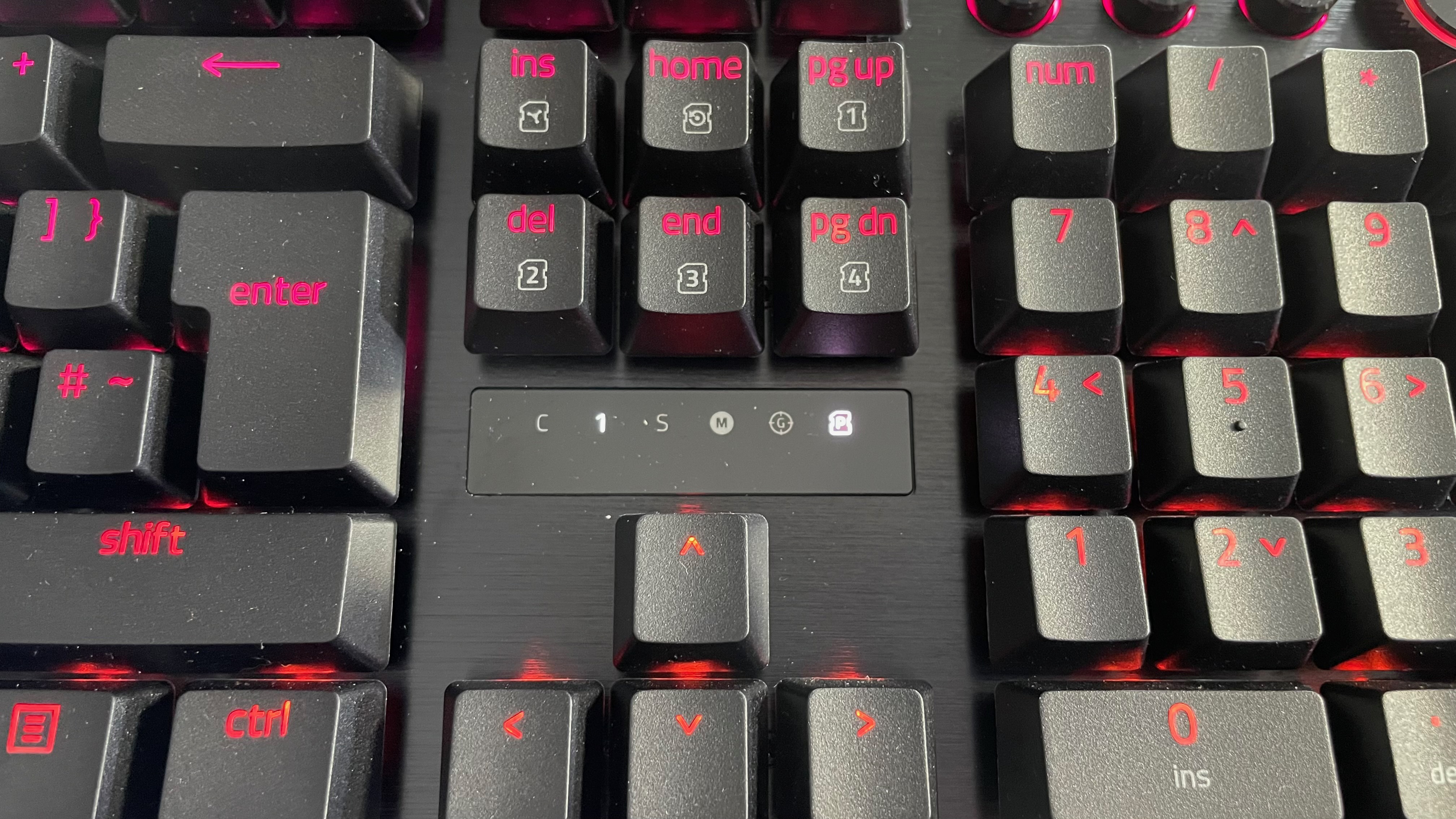
Razer Huntsman V3 Pro review: Price and release date
- How much does it cost? $249.99 / £249.99 / AU$469.95
- Where is it available? Available now
- Where can you get it? Available in the US, the UK and Australia
Priced at $249.99 / £249.99 / AU$469.95, this gaming keyboard costs serious money. If you’re someone that just enjoys a casual Thursday night Halo session with friends then this is understandably going to be off-putting, but if you’re looking for a bucketload of customization options so that you can thoroughly fine-tune your keys across different games and tasks, then the price tag could well be worth it.
There is, of course, an abundance of options available on the market that will suit different budgets, but if you’re sold on the Huntsman V3 Pro then there is a slight saving to be had with the Razer Huntsman V3 Pro Tenkeyless, if you aren’t fussed about the keypad, as this lowers the cost to $219.99 / £219.99 / AU$419.95.
Razer Huntsman V3 Pro review: Specs
| Layout | Standard full size |
| Switch | Razer Analog Optical Switch Gen-2 |
| Programmable Keys | Yes |
| Dimensions | 5.5 x 1.5 x 17.5 inches / 139 x 39 x 445mm |
| RGB or backlighting | Razer Chroma RGB (16.8M colors) |
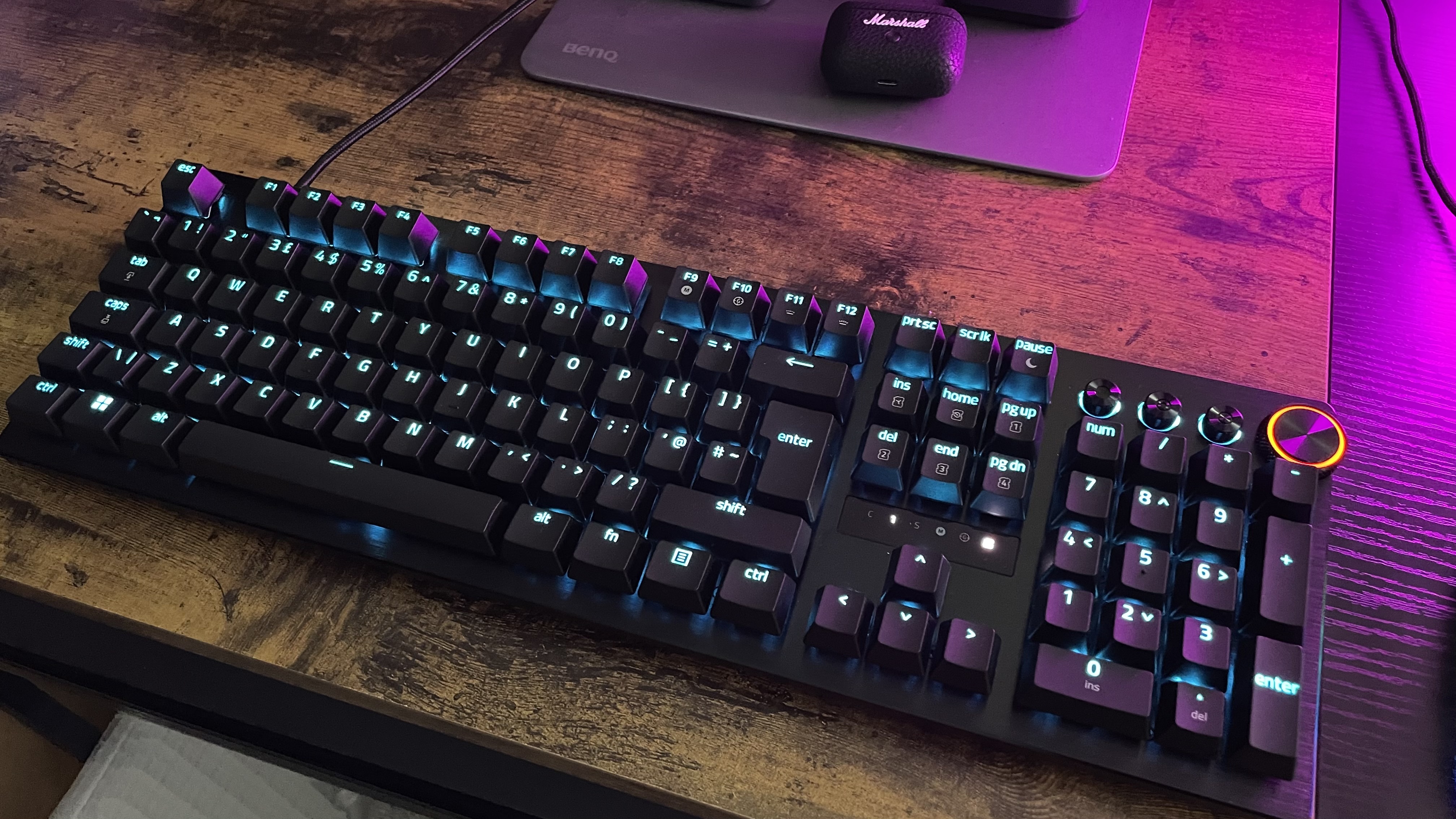
Should you buy the Razer Huntsman V3 Pro?
| Attributes | Notes | Rating |
| Features | With adjustable actuation, Rapid Trigger Mode and a load of other customization possibilities, this is a control-freak’s dream. | 5 / 5 |
| Design | The optical switches and doubleshot PBT keycaps are great, and it feels hard-wearing. Shame about the wrist rest. | 4 / 5 |
| Performance | Very responsive, and it’s easy to switch modes and settings while playing. Razer Synapse is a bit of a chore, though. | 4.5 / 5 |
| Value | You can’t fault the high-quality design and standout features, but it definitely isn’t priced for the average gamer. | 3 / 5 |
Buy it if…
Don’t buy it if…
Razer Huntsman V3 Pro review: Also consider
| Header Cell – Column 0 | Razer Huntsman V3 Pro | SteelSeries Apex Pro TKL | MSI Vigor GK71 Sonic |
|---|---|---|---|
| Price | $249.99 / £249.99 / AU$469.95 | $189.99 / £189.99 / AU$219.99 | Price: $129 / £109.99 |
| Layout | Standard full size | TKL | Standard full size |
| Switch | Razer Analog Optical Switch Gen-2 | OmniPoint 2.0 adjustable switches | MSI Sonic Blue mechanical |
| Programmable keys | Yes | Yes | Yes |
| Adjustable Actuation | Yes | Yes | No |
| Dimensions | 17.5 x 5.5 x 1.5 inches / 445 x 139 x 39 mm | 14 x 5 x 1.7 inches / 355 x 128 x 42mm | 17.4 x 5.4 x 1.6 inches / 442.5 x 138 x 41mm |
| RGB or backlighting | RGB | RGB | RGB |
How I tested the Razer Huntsman V3 Pro
- Used to play games, as well as to write articles and in general use
- Tested with a gaming laptop to ensure good performance
I tested the Razer Huntsman V3 Pro keyboard in the TechRadar office, using it to write articles and emails at work, as well as playing some games on an Acer Predator Helios 300 laptop.
I spent a lot of time customizing different elements, such as the RGB and key programming options. I tested out the various preset profiles as well as my own customizations, and assessed the differences for both typing and gaming when the actuation points and rapid trigger were adjusted.
We pride ourselves on our independence and our rigorous review-testing process, offering up long-term attention to the products we review and making sure our reviews are updated and maintained – regardless of when a device was released, if you can still buy it, it’s on our radar.
- First reviewed: April 2024

